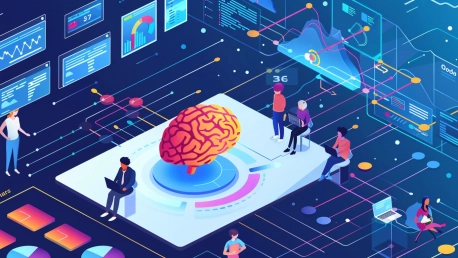As organizations seek to remain competitive in a rapidly evolving digital landscape, cognitive computing has emerged as a transformative force in data analytics. This article explores the potential of cognitive computing to redefine how businesses process and interpret vast amounts of data, delivering insights with unprecedented accuracy and efficiency.
The Rise of Cognitive Computing in Data Analytics
Defining Cognitive Computing and Its Capabilities
Cognitive computing systems, with their capacity to simulate human thought processes, represent a breakthrough in artificial intelligence technology. Incorporating a sophisticated blend of machine learning, natural language processing, and artificial neural networks, these systems process unstructured data, discern patterns, and autonomously generate insights in a manner akin to the human brain. This intricate confluence of technologies lays a foundation that is transforming data analytics by endowing computers with the ability to understand, reason, and learn from data in real-time, propelling businesses into the next frontier of data-centric innovation.
Accelerating Big Data Analytics with Cognitive Computing
The relentless influx of big data has led to a heightened demand for tools capable of handling its volume, variety, and velocity. Cognitive computing answers this call by offering a highly efficient way to process and analyze unstructured data. With its inherent ability to sift through and analyze massive datasets quickly, cognitive computing is becoming an indispensable asset for businesses drowning in data. It provides a scalpel-like precision in unearthing valuable insights from the digital deluge that organizations face on a daily basis.
Market Growth and Future Projections
Market Trajectory and Key Players
The cognitive computing market, with a valuation soaring from USD 11.11 billion in 2023 to an anticipated USD 36.45 billion by 2032, is indicative of the technology’s significant role and burgeoning adoption. This impressive growth trajectory is powered by the efforts of industry heavyweights such as Alphabet Inc. (Google), Microsoft Corporation, and IBM Corporation, as well as rising stars like SparkCognition Inc. and Palantir Technologies. Each of these key players is contributing in unique ways to the expansion of the cognitive computing marketplace, carving out niches that push the boundaries of what the technology can achieve.
Technological Advancements Spurring Growth
Technological innovations continue to expand the reach of cognitive computing. Notable advances like touch-based and voice-activated infotainment systems in vehicles exemplify how these intelligent systems can be woven into our daily experiences. Such advancements are not mere incremental steps but leaps that extend cognitive computing’s capabilities into new sectors, showcasing its potential to be seamlessly integrated into both consumer and enterprise domains.
Cognitive Computing’s Impact Across Industries
Transforming the BFSI Sector
Within the banking, financial services, and insurance (BFSI) sector, cognitive computing acts as a harbinger of change, introducing new paradigms for customer service, fraud detection, and risk management. By applying predictive analytics, financial institutions can anticipate trends, craft personalized experiences for customers, and ensure regulatory compliance with greater accuracy. The power of cognitive computing in unlocking such potential showcases a future where finance is not only more secure but also more attuned to the individual needs of consumers.
Advancements in Healthcare and Retail
In healthcare, cognitive computing’s ability to analyze vast quantities of data is charting new pathways for diagnostic accuracy and individualized treatment plans. Meanwhile, in the retail sector, it is transforming inventory management and customer relationship dynamics. These advancements signify a broader shift towards an interconnected, intelligent enterprise environment. Leveraging cognitive computing, businesses in these industries are able to evolve in step with rapidly changing consumer expectations and market conditions.
Challenges and Considerations for Adoption
Tackling the High Cost of Implementation
The journey towards integrating cognitive computing is fraught with financial considerations, particularly regarding the initial outlay required. Small and medium enterprises (SMEs), in particular, may find the upfront costs a formidable barrier to entry. To address these concerns, it is vital for businesses to weigh the long-term benefits against the costs and seek out scalable cognitive computing solutions that ensure a smoother financial transition.
Embracing Cognitive Computing in SMEs
To maintain an edge in the fast-paced digital arena, organizations are turning to cognitive computing, a key driver in reshaping data analytics. This innovative approach is propelling businesses forward, equipping them with tools to analyze and understand massive datasets with a level of precision and speed that was once unimaginable. Cognitive computing unlocks a revolutionary way for companies to handle information, making it possible to gain deep insights that can inform strategies and operational improvements. As we delve into the capabilities of this technology, it’s becoming clear that cognitive computing doesn’t just change the game—it has the potential to dramatically alter the business intelligence landscape, ensuring that enterprises who harness its power can stay at the forefront of their respective industries.









